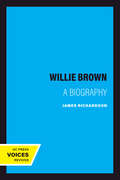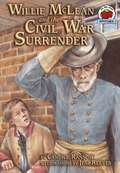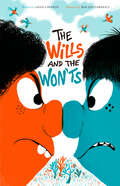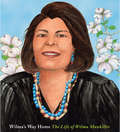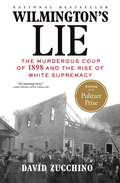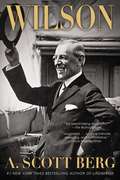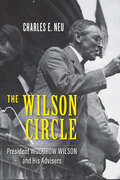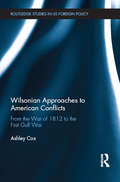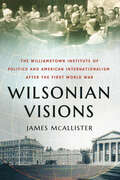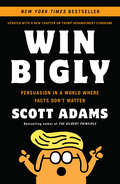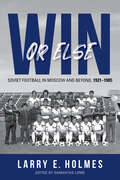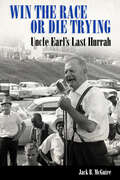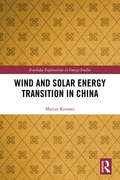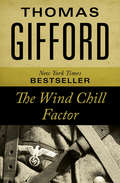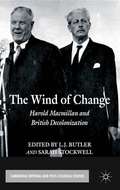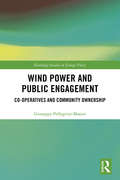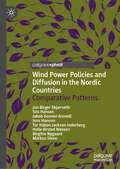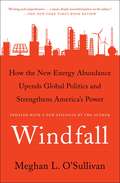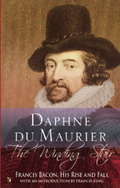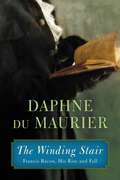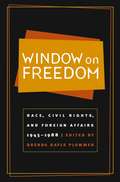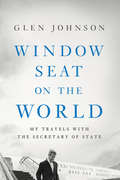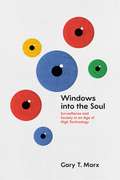- Table View
- List View
Willie Brown: A Biography
by James RichardsonThis is the first comprehensive biography of Willie Brown, one of California's most enduring and controversial politicians. Audacious, driven, talented—Brown has dominated California politics longer and more completely than any other public figure. James Richardson, a senior writer for The Sacramento Bee, takes us from Brown's childhood, through his years as Speaker of the State Assembly, to his election as San Francisco's mayor. Along the way we get a riveting, behind-the-scenes account of three decades of California politics.
Willie Mclean and the Civil War Surrender (On My Own History)
by Candice RansomEleven-year-old Willie McLean knows that General Lee will defeat the Yankees and win the Civil War, he just knows it. When a battle moves to the fields near his home in Appomattox, Virginia, Willie's thrilled-especially when General Lee himself comes to Willie's house! But then General Grant comes too. Overhearing the two men talk, Willie hears one word: Surrender. Is the war really over?
The Wills and the Won'ts
by Angela WoolfeDr. Seuss&’s The Sneetches and Other Stories meets The Wall in the Middle of the Book in this pitch perfect, rhyming story about breaking down barriers and embracing our differences.An angry old Won&’t and a cheerless young Willlived next to each other, on top of a hill.They squabbled and quarrelled, did nothing but fight.If one said, "It&’s day," said the other, "It&’s night.""Your dog wrecked my roses!" "Your trees are too tall!""There&’s one way to end this: WE&’RE BUILDING A WALL!" The Wills and the Won&’ts can&’t seem to agree on anything, so they build a wall to keep the other out. Until a hopeful young May realizes that perhaps they can find some common ground, if only they work together. A fantastically timely and timeless read-aloud with the bouncing rhyme of Dr. Seuss and a message that will resonate with readers of all ages: Tolerance and togetherness put us all on the same side.
Wilma's Way Home: The Life of Wilma Mankiller (Big Words)
by Doreen RappaportAs a child in Oklahoma, Wilma Mankiller experienced the Cherokee practice of Gadugi, helping each other, even when times were hard for everyone. But in 1956, the federal government uprooted her family and moved them to California, wrenching them from their home, friends, and traditions. Separated from her community and everything she knew, Wilma felt utterly lost until she found refuge in the Indian Center in San Francisco. There, she worked to build and develop the local Native community and championed Native political activists. She took her two children to visit tribal communities in the state, and as she introduced them to the traditions of their heritage, she felt a longing for home.Returning to Oklahoma with her daughters, Wilma took part in Cherokee government. Despite many obstacles, from resistance to female leadership to a life-threatening accident, Wilma's courageous dedication to serving her people led to her election as the first female chief of the Cherokee Nation. As leader and advocate, she reinvigorated her constituency by empowering them to identify and solve community problems.This beautiful addition to the Big Words series will inspire future leaders to persevere in empathy and thoughtful problem-solving, reaching beyond themselves to help those around them. Moving prose by award-winning author Doreen Rappaport is interwoven with Wilma's own words in this expertly researched biography, illustrated with warmth and vivacity by Linda Kukuk.
Wilmington's Lie: The Murderous Coup of 1898 And The Rise of White Supremacy
by David ZucchinoBy the 1890s, Wilmington was North Carolina’s largest city and a shining example of a mixed-race community. It was a bustling port city with a burgeoning African American middle class and a Fusionist government of Republicans and Populists that included black aldermen, police officers and magistrates. There were successful black-owned businesses and an African American newspaper, The Record. But across the state—and the South—white supremacist Democrats were working to reverse the advances made by former slaves and their progeny. In 1898, in response to a speech calling for white men to rise to the defense of Southern womanhood against the supposed threat of black predators, Alexander Manly, the outspoken young Record editor, wrote that some relationships between black men and white women were consensual. His editorial ignited outrage across the South, with calls to lynch Manly. But North Carolina’s white supremacist Democrats had a different strategy. They were plotting to take back the state legislature in November “by the ballot or bullet or both,” and then use the Manly editorial to trigger a “race riot” to overthrow Wilmington’s multi-racial government. Led by prominent citizens including Josephus Daniels, publisher of the state’s largest newspaper, and former Confederate Colonel Alfred Moore Waddell, white supremacists rolled out a carefully orchestrated campaign that included raucous rallies, race-baiting editorials and newspaper cartoons, and sensational, fabricated news stories. With intimidation and violence, the Democrats suppressed the black vote and stuffed ballot boxes (or threw them out), to win control of the state legislature on November eighth. Two days later, more than 2,000 heavily armed Red Shirts swarmed through Wilmington, torching the Record office, terrorizing women and children, and shooting at least sixty black men dead in the streets. The rioters forced city officials to resign at gunpoint and replaced them with mob leaders. Prominent blacks—and sympathetic whites—were banished. Hundreds of terrified black families took refuge in surrounding swamps and forests. This brutal insurrection is a rare instance of a violent overthrow of an elected government in the U.S. It halted gains made by blacks and restored racism as official government policy, cementing white rule for another half century. It was not a “race riot,” as the events of November 1898 came to be known, but rather a racially motivated rebellion launched by white supremacists. In this book, the author uses contemporary newspaper accounts, diaries, letters and official communications to create a gripping and compelling narrative that weaves together individual stories of hate and fear and brutality. This is a dramatic and definitive account of a remarkable but forgotten chapter of American history.
Wilson
by A. Scott Berg"With the prescience that all truly great biographers possess, Berg discovered in Woodrow Wilson a figure who would understand Washington's current state of affairs."--Vanity Fair "A brilliant biography that still resonates in Washington today."--Doris Kearns Goodwin From Pulitzer Prize-winning, #1 New York Times-bestselling author A. Scott Berg comes the definitive--and revelatory--biography of one of the great American figures of modern times. One hundred years after his inauguration, Woodrow Wilson still stands as one of the most influential figures of the twentieth century, and one of the most enigmatic. And now, after more than a decade of research and writing, Pulitzer Prize-winning author A. Scott Berg has completed Wilson--the most personal and penetrating biography ever written about the 28th President. In addition to the hundreds of thousands of documents in the Wilson Archives, Berg was the first biographer to gain access to two recently-discovered caches of papers belonging to those close to Wilson. From this material, Berg was able to add countless details--even several unknown events--that fill in missing pieces of Wilson's character and cast new light on his entire life. From the scholar-President who ushered the country through its first great world war to the man of intense passion and turbulence , from the idealist determined to make the world "safe for democracy" to the stroke-crippled leader whose incapacity and the subterfuges around it were among the century's greatest secrets, the result is an intimate portrait written with a particularly contemporary point of view - a book at once magisterial and deeply emotional about the whole of Wilson's life, accomplishments, and failings. This is not just Wilson the icon - but Wilson the man.
The Wilson Circle: President Woodrow Wilson and His Advisers
by Charles E. NeuAn in-depth look at the key advisers to Woodrow Wilson during the course of his tumultuous presidency.Nearly 100 years after Woodrow Wilson's death, historians continue to be divided over the impact of his presidency and his political leadership. The collapse of Wilson's health in 1919 and his failure to win Senate approval of the Versailles Treaty have tainted his legacy, as have the racism of his administration and its disregard for civil liberties after American entry into World War I. In The Wilson Circle, Charles E. Neu takes a new look at the Wilson presidency through the lens of his inner circle, a group of ten advisers. Some of these advisers, like his wife Ellen, were by his side at the start of his term, while others joined him as the challenges facing Wilson's presidency mounted. All of these advisers believed that, whatever Wilson's flaws as a leader, they had served a great man whose legacy would endure. Struck by his magnetism, his oratorical gifts, and the power and precision of his mind, they each became, to one extent or another, friends of the president. Looking back, they acknowledged that their relationship with Woodrow Wilson had transformed their lives.Challenging the publicly held assumption that Wilson was a remote, harsh president by exploring the intense emotional connection he developed with this tight-knit group, Neu argues that we can partially credit Wilson's remarkable journey in American politics to his ability to bring together such an impressive group of advisers. Wilson realized that, given his limited energy and experience, he had to rely on advisers to help him maintain his physical and emotional equilibrium and to achieve his far-reaching political goals. And as the demands on his presidency changed, changes also occurred in his group of presidential confidants. Informing vivid biographical sketches with a wide range of recent scholarship, The Wilson Circle shines a light on the exceptional people whose advice impacted the course of a presidency.
The Wilson Plot
by David LeighIn a historic decision, the House of Lords on October 12 reversed the Thatcher government's ban on "quoting from Spycatcher" opening the way for the publication in England and the United States of The Wilson Plot -the highly controversial and explosive account of what the spycatchers were really up to. Using hitherto unknown material from Peter Wright, author of Spycatcher, and interviews with dozens of his sources, the London Observer's David Leigh has put together an unbelievable story of paranoia and treachery in the British and American intelligence agencies, revealing a wealth of "dirty tricks" played against democratic governments - a treason never discussed in the other spycatcher books. Leigh traces the spycatchers' obsession that Labour prime minister Harold Wilson was, incredibly, a Soviet spy - and shows how they tried to persuade British officers to join in an attempt to overthrow the popularly elected government. Leigh discusses the role of CIA chief James Angleton and uncovers the true motives of Wilson's accusers: playing on anti-communist hysteria, the CIA and MI5 set out to defame those individuals whose politics interfered with the intelligence agenda. Amazingly, such plots succeeded in Australia, and perhaps even toppled Willy Brandt's government in Germany as well. In exploring the incredible complexities of postwar espionage, Leigh turns a bright light on the murky corners of a secret world that is illuminated here for the first time.
Wilsonian Approaches to American Conflicts: From the War of 1812 to the First Gulf War (Routledge Studies in US Foreign Policy)
by Ashley CoxThis book explores US foreign policy, specifically the history of America’s entry into the War of 1812, the First World War, the Korean War and the First Gulf War. Using a historical case study approach, it demonstrates how the Wilsonian Framework can give us a unique understanding of why the United States chose to go to war in those four conflicts. Cox argues that the Wilsonian Framework is an important concern for decision makers in the US and that democracy promotion and the concept of international law are driving factors in each of these decisions to go to war. The realist and economic explanations of these conflicts are not sufficient and we must draw on Wilsonianism to gain a clear understanding of these conflicts. Drawing on the history of American liberalism and the work of Walter Russel Mead and Tony Smith, the book presents a definition of Wilsonianism that represents a broad span of the history of The Republic, in order to show consistency across time. It also establishes why the realist and economic explanations fail to provide sufficient explanatory power and how the Wilsonian Framework can give important insights into these conflicts. This book will be of interest to international historians and international relations scholars at both postgraduate and scholar level. It will also be of use to those wishing to conduct future research into the motivations that drive the foreign and security policies of the United States.
Wilsonian Visions: The Williamstown Institute of Politics and American Internationalism after the First World War
by James McAllisterIn Wilsonian Visions, James McAllister recovers the history of the most influential forum of American liberal internationalism in the immediate aftermath of the First World War: The Williamstown Institute of Politics. Established in 1921 by Harry A. Garfield, the president of Williams College, the Institute was dedicated to promoting an informed perspective on world politics even as the United States, still gathering itself after World War I, retreated from the Wilsonian vision of active involvement in European political affairs. Located on the Williams campus in the Berkshire Mountains of Western Massachusetts, the Institute's annual summer session of lectures and roundtables attracted scholars, diplomats, and peace activists from around the world. Newspapers and press services reported the proceedings and controversies of the Institute to an American public divided over fundamental questions about US involvement in the world. In an era where the institutions of liberal internationalism were just taking shape, Garfield's institutional model was rapidly emulated by colleges and universities across the US. McAllister narrates the career of the Institute, tracing its roots back to the tragedy of the First World War and Garfield's disappointment in America's failure to join the League of Nations. He also shows the Progressive Era origins of the Institute and the importance of the political and intellectual relationship formed between Garfield and Wilson at Princeton University in the early 1900s. Drawing on new and previously unexamined archival materials, Wilsonian Visions restores the Institute to its rightful status in the intellectual history of US foreign relations and shows it to be a formative institution as the country transitioned from domestic isolation to global engagement.
Win Bigly: Persuasion in a World Where Facts Don't Matter
by Scott Adams"If you watched the entire election cycle and concluded that Trump was nothing but a lucky clown, you missed one of the most important perceptual shifts in the history of humankind. I'll fix that for you in this book." Adams was one of the earliest public figures to predict Trump’s win, doing so a week after Nate Silver put Trump’s odds at 2 percent in his FiveThirtyEight.com blog. The mainstream media regarded Trump as a novelty and a sideshow. But Adams recognized in Trump a level of persuasion you only see once in a generation. Trump triggered massive cognitive dissonance and confirmation bias on both the left and the right. We’re hardwired to respond to emotion, not reason. We might listen to 10 percent of a speech—a hand gesture here, a phrase there—and if the right buttons are pushed, we decide we agree with the speaker and invent reasons to justify that decision after the fact. The point isn’t whether Trump was right or wrong, good or bad. Win Bigly goes beyond politics to look at persuasion tools that can work in any setting—the same ones Adams saw in Steve Jobs when he invested in Apple decades ago. For instance: · If you need to convince people that something is important, make a claim that’s directionally accurate but has a big exaggeration in it. Everyone will spend endless hours talking about how wrong it is and will remember the issue as high priority. · Stop wasting time on elaborate presentation preparations. Inside, you’ll learn which components of your messaging matter, and where you can wing it. · Planting simple, sticky ideas (such as “Crooked Hillary”) is more powerful than stating facts. Just find a phrase without previous baggage that grabs your audience at an emotional level. Adams offers nothing less than “access to the admin passwords to human beings.” This is a must read if you care about persuading others in any field—or if you just want to resist the tactics of emotional persuasion when they’re used on you.
Win or Else: Soviet Football in Moscow and Beyond, 1921–1985
by Larry E. HolmesIn Win or Else, Larry E. Holmes shows us how Soviet football culture regularly disregarded official ideological and political imperatives and skirted the boundaries between socialism and capitalism. In the early 1920s, the Soviet press denounced football as a bourgeois sport that was injurious to both mind and body. Within that same decade, however, it blew up, becoming the most popular spectator sport in the USSR and growing into a fiercely competitive business with complex regional and national bureaucracies, a strong international presence, and a conviction that victory on the field was also a victory of Soviet supremacy. Writing as both historian and fan, Holmes focuses his study on the provincial Kirov team Dinamo from 1979 to 1985, when the club played at both its worst and its best. Spurred by a dismal 1979 season, the team's administrators and regional authorities had two options: obey Moscow's edict to reduce expenditures on professional sports or seek out new—and often illicit—funding sources to fill out a team of champions. Drawing on rich archival materials as well as newspapers and interviews with former players, Win or Else reveals the foundations of Soviet sports culture—and the hazards that teams faced both in victory and in loss.
Win the Race or Die Trying: Uncle Earl's Last Hurrah
by Jack B. McGuireEarl Kemp Long (1895–1960) was the political heir to his brother Huey in Louisiana politics. A country boy who never lost his common touch, he ran for office in every state election between 1933 and 1959. He was the best campaigning politician Louisiana ever produced. In his final term as governor, he suffered a breakdown on live television while addressing members of the legislature. He was kidnapped and committed to mental institutions in Texas and Louisiana. That he engineered his own release gives proof that he was in charge of his faculties. Abandoned by his family and his allies, Long was written off politically. But in 1960, he had other ideas. He was plotting his comeback. In poor health, smoking and drinking, he decided to challenge the incumbent in Louisiana's Eighth Congressional District, Harold McSween. Doctors warned him that the race could cost him his life. But politics was his life, and he vowed to win the election or die trying. He did both. This book tells the story of the last year of Long's life and the campaign that he waged and won by sheer force of will. He won the election (and a sizable bet he placed on it), but he was dead in just over a week. Win the Race or Die Trying captures the essence of Earl Long by chronicling the desperate, death-defying campaign he waged to redefine his legacy.
Wind and Solar Energy Transition in China (Routledge Explorations in Energy Studies)
by Marius KorsnesThis book explores the mobilisation of China’s wind and solar industries and examines the implications of this development to energy generation and distribution, innovation and governance. Unlike other publications that focus mainly on the formal policy landscape and statistics of industry development, this book delves deeper into the ways in which the wind and solar industries have evolved through negotiations made by the involved stakeholders, and how these industries play into larger Chinese development and policymaking interests. Overall, it sheds new light on the strategic development of China’s renewable energy industry, the flexible governance methods employed and the internal struggles which Chinese local, regional and central policymakers, and state-owned and private enterprises have faced. This book will be of great relevance to students and scholars of renewable energy technologies, energy policy and sustainability transitions, as well as policymakers with a specific interest in China.
The Wind Chill Factor
by Thomas GiffordA man is endangered by his family&’s long-ago Nazi ties in this &“riveting&” thriller by a New York Times–bestselling author (Rolling Stone). His marriage destroyed by drinking, John Cooper returns to Cambridge, Massachusetts, trying to recapture the joy he felt as an undergraduate in Harvard University&’s sacred halls. He is just beginning to piece his life together when he gets a telegram calling him home to Minnesota. The message comes from Buenos Aires, and with Cooper&’s family history, that can mean only one thing: The Nazis are staging a comeback. To John and his brother, their grandfather was a kind, distinguished old man. But to the American people, he was the worst kind of traitor. An industrialist who spent the 1930s in business with Fascists, he became infamous as &“America&’s Number One Nazi.&” When Hitler&’s old lieutenants decide to get together a Fourth Reich, the Coopers are the first family they call. John hasn&’t even made it to Minnesota when the first attempt on his life comes—a message that if he isn&’t ready to honor his family legacy, he will die for it.
The Wind of Change
by L. J. Butler Sarah StockwellHarold Macmillan's 'Wind of Change' speech, delivered to the South African parliament in Cape Town at the end of a landmark six-week African tour, presaged the end of the British Empire in Africa. This book, the first to focus on Macmillan's 'Wind of Change', comprises a series of essays by leading historians in the field.
Wind Power and Public Engagement: Co-operatives and Community Ownership (Routledge Studies in Energy Policy)
by Giuseppe Pellegrini-MasiniAdopting an interdisciplinary social science approach, this book examines community reactions to wind farms to form a new understanding of what facilitates social acceptance. Based on empirical research, Wind Power and Public Engagement investigates opposition to wind energy and considers the advantages as well as the limits of the co-operative model of wind farm community ownership. Giuseppe Pellegrini-Masini compares the role of co-operative schemes with community benefits schemes in increasing acceptability, and also sheds light on the impact of social factors including pro-environmental attitudes, perceived benefits and costs, place attachment, trust, as well as individuals’ resources such as information and income. Five research cases are investigated in England and Scotland, including the first local, community-owned wind farm co-operative in the UK. Critically reviewing existing social research theories, the book offers a new viewpoint, integrating rational choice and environmental attitudinal theories, from which to assess and understand the social acceptability of wind energy. It also highlights new opportunities for raising consensus in communities around locally proposed wind farms. The book will be of great interest to students and scholars of renewable energy, energy policy, environmental sociology, environmental psychology, environmental planning and sustainability in general, as well as policymakers.
Wind Power Policies and Diffusion in the Nordic Countries: Comparative Patterns
by Jon Birger Skjærseth Teis Hansen Jakob Donner-Amnell Jens Hanson Helle Ørsted Nielsen Birgitte Nygaard Markus Steen Tor Håkon InderbergThis book focuses specifically on policy mixes and wind power diffusion in four Nordic countries – Denmark, Finland, Norway and Sweden. Although these Nordic welfare states have much in common, they have adopted different wind power policies and experienced dissimilar diffusion trajectories. Understanding these patterns across the Nordic countries is the central puzzle that this book investigates. Empirically, this book provides a first-of-its-kind comparative study of wind power policies in the Nordic countries. Analytically, the authors contribute to the transition policy mix literature, which remains largely insensitive to political feasibility. This book will be of interest to researchers and students as well as private and public decision makers looking for tools to enable the energy transition.
Windfall: How the New Energy Abundance Upends Global Politics and Strengthens America's Power
by Meghan L. O'SullivanWindfall is the boldest profile of the world’s energy resources since Daniel Yergin’s The Quest. Harvard professor and former Washington policymaker Meghan L. O’Sullivan reveals how fears of energy scarcity have given way to the reality of energy abundance. This abundance is transforming the geo-political order and boosting American power.As a new administration focuses on raising American energy production, O’Sullivan’s Windfall describes how new energy realities have profoundly affected the world of international relations and security. New technologies led to oversupplied oil markets and an emerging natural gas glut. This did more than drive down prices. It changed the structure of markets and altered the way many countries wield power and influence. America’s new energy prowess has global implications. It transforms politics in Russia, Europe, China, and the Middle East. O’Sullivan explains the consequences for each region’s domestic stability as energy abundance upends traditional partnerships, creates opportunities for cooperation. The advantages of this new abundance are greater than its downside for the US: it strengthens American hard and soft power. This powerful book describes how new energy realities creates a strategic environment to America’s advantage.
The Winding Stair: Francis Bacon, His Rise and Fall (Vmc Ser. #670)
by Daphne Du MaurierFROM THE BESTSELLING AUTHOR OF REBECCAMany accounts of the life of Francis Bacon have been written for scholars. But du Maurier's aim in this biography was to illuminate the many facets of Bacon's remarkable personality for the common reader.To her book she brought the same gifts of imagination and perception that made her earlier biography, Golden Lads, so immensely readable, skilfully threading into her narrative extracts from contemporary documents and from Bacon's own writings, and setting her account of his life within a vivid contemporary framework.This is truly history made alive.Unlike many authors of popular historical biographies, du Maurier resembled Antonia Fraser in being an indefatigable researcher - Francis King
The Winding Stair: Francis Bacon, His Rise and Fall (Virago Modern Classics #131)
by Daphne Du MaurierFROM THE BESTSELLING AUTHOR OF REBECCAMany accounts of the life of Francis Bacon have been written for scholars. But du Maurier's aim in this biography was to illuminate the many facets of Bacon's remarkable personality for the common reader.To her book she brought the same gifts of imagination and perception that made her earlier biography, Golden Lads, so immensely readable, skilfully threading into her narrative extracts from contemporary documents and from Bacon's own writings, and setting her account of his life within a vivid contemporary framework.This is truly history made alive.Unlike many authors of popular historical biographies, du Maurier resembled Antonia Fraser in being an indefatigable researcher - Francis King
The Winding Stair: Francis Bacon, His Rise and Fall
by Daphne Du Maurier"Unlike many authors of popular historical biographies, du Maurier resembled Antonia Fraser in being an indefatigable researcher." --Francis King Many accounts of the life of Francis Bacon have been written for scholars. But du Maurier's aim in this biography was to illuminate the many facets of Bacon's remarkable personality for the common reader. To her book she brought the same gifts of imagination and perception that made her earlier biography, Golden Lads, so immensely readable, skillfully threading into her narrative extracts from contemporary documents and from Bacon's own writings, and setting her account of his life within a vivid contemporary framework.
Window on Freedom
by Brenda Gayle PlummerThe civil rights movement in the United States drew strength from supporters of human rights worldwide. Once U.S. policy makers--influenced by international pressure, the courage of ordinary American citizens, and a desire for global leadership--had signed such documents as the United Nations charter, domestic calls for change could be based squarely on the moral authority of doctrines the United States endorsed abroad. This is one of the many fascinating links between racial politics and international affairs explored in Window on Freedom. Broad in chronological scope and topical diversity, the ten original essays presented here demonstrate how the roots of U.S. foreign policy have been embedded in social, economic, and cultural factors of domestic as well as foreign origin. They argue persuasively that the campaign to realize full civil rights for racial and ethnic minorities in America is best understood in the context of competitive international relations.The contributors are Carol Anderson, Donald R. Culverson, Mary L. Dudziak, Cary Fraser, Gerald Horne, Michael Krenn, Paul Gordon Lauren, Thomas Noer, Lorena Oropeza, and Brenda Gayle Plummer.ContributorsCarol Anderson, University of Missouri-Columbia (Columbia, Mo.)Donald R. Culverson, Governors State University (University Park, Ill.)Mary L. Dudziak, University of Southern California (Los Angeles, Calif.)Cary Fraser, Penn State University (University Park, Pa.)Gerald Horne, University of North Carolina at Chapel Hill (Chapel Hill, N.C.)Michael Krenn, Appalachian State University (Boone, N.C.)Paul Gordon Lauren, University of Montana (Missoula, Mont.)Thomas Noer, Carthage College (Kenosha, Wis.)Lorena Oropeza, University of California, Davis (Davis, Calif.)Brenda Gayle Plummer, University of Wisconsin-Madison (Madison, Wis.)-->
Window Seat on the World: My Travels With The Secretary Of State
by Glen JohnsonUnless they've lost a passport abroad, most Americans have little appreciation for the reach and scope of the US Department of State or the perils faced by its employees. Reporter Glen Johnson had been covering politics for the Boston Globe when he received a job offer that would embed him in this world of protocols, planes, and global peacekeeping. His new boss would be Secretary of State John Kerry, set to become the most prominent diplomat on the world stage. Johnson sensed it was a meeting of man and moment. For four years, he accompanied Kerry as he became the most-traveled Secretary of State in history. The former journalist kept notes while Kerry worked out a power-sharing agreement in Afghanistan, negotiated with the Israelis, convinced Iran to get rid of its nuclear weapons program, developed a counter-ISIS coalition, and brokered climate change agreements, including the 2015 Paris Agreement. Kerry also confronted two lingering challenges: how to cooperate with an assertive China and a Russia that sidestepped its own wrongdoing but felt aggrieved and justified to interfere in the 2016 presidential election. In his goal to create the best and most complete photo archive of any Secretary of State, Johnson lobbied the State Department for a decent camera and shot more than 100,000 photographs everywhere Kerry went—from the office of Pope Francis to center ice for a puck drop at Madison Square Garden, from the Kremlin and No. 10 Downing Street to a helicopter flying over Antarctica. Window Seat on the World is an all-access look at life inside the nation's first cabinet agency: the complexity of State Department protocols, the grueling schedules, the delicacy of engagement with world leaders and foreign cultures, and the dedication of a longtime public servant and his team to the practice of diplomacy.
Windows into the Soul: Surveillance and Society in an Age of High Technology
by Gary T. MarxWe live in an age saturated with surveillance. Our personal and public lives are increasingly on display for governments, merchants, employers, hackers--and the merely curious--to see. In Windows into the Soul, Gary T. Marx, a central figure in the rapidly expanding field of surveillance studies, argues that surveillance itself is neither good nor bad, but that context and comportment make it so. In this landmark book, Marx sums up a lifetime of work on issues of surveillance and social control by disentangling and parsing the empirical richness of watching and being watched. Using fictional narratives as well as the findings of social science, Marx draws on decades of studies of covert policing, computer profiling, location and work monitoring, drug testing, caller identification, and much more, Marx gives us a conceptual language to understand the new realities and his work clearly emphasizes the paradoxes, trade-offs, and confusion enveloping the field. Windows into the Soul shows how surveillance can penetrate our social and personal lives in profound, and sometimes harrowing, ways. Ultimately, Marx argues, recognizing complexity and asking the right questions is essential to bringing light and accountability to the darker, more iniquitous corners of our emerging surveillance society. For more information, please see www.garymarx.net.
